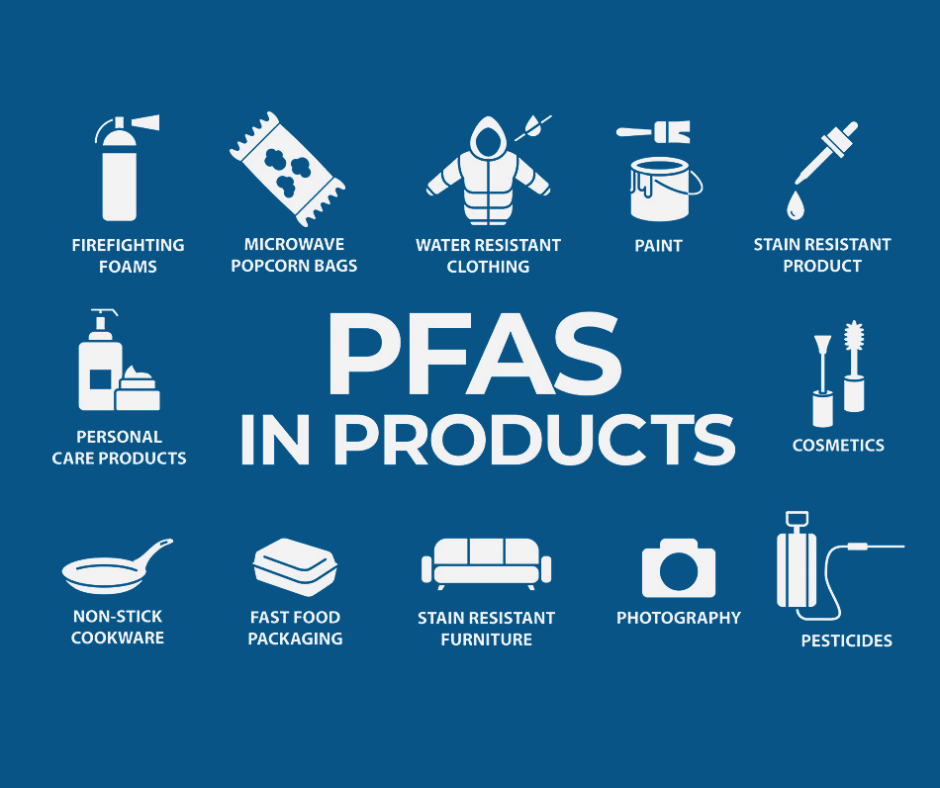
Protected: PFAS FAQs

Below find frequently asked questions about PFAS (Per- and Polyfluoroalkyl Substances). As awareness of PFAS contamination and its potential health risks grows, it is crucial to have access to reliable information. This resource aims to provide clear and concise answers to common inquiries regarding PFAS sources, health effects, regulations, remediation methods, and more. We have gathered the most up-to-date knowledge from reputable sources to empower you with the information needed regarding PFAS.
PFAS (Per- and Poly-Fluoroalkyl substances) are a large group of human-made chemicals that have been used in industry and consumer products worldwide since the 1940s. There are hundreds of PFAS variations, each made up of a very complex structure of carbon and fluorine atoms. Exposure to certain PFAS may lead to adverse health and environmental impacts. PFAS are detected at a very low level (part per trillion) and are mobile through air, water and soil pathways. These chemicals are very prevalent and found everywhere in our environment and do not break down over time. They can remain in the environment and groundwater indefinitely. PFAS can be remediated and removed from water supplies with proper treatment mechanisms.
PFAS can be found in drinking water, food, indoor dust, and industrial and consumer products. The following are examples of PFAS release sites and generators:
- Airports
- Wastewater Treatment Facilities
- Manufacturing Sites
- Car Washes
- Landfills and Transfer Stations
- Fire Departments
- Military Bases
- Chemical Production
- Fire Training Academies
- Automotive Industry
- Atmospheric Releases
- Food Production
- Energy Sector
- Pharmaceutical
- Mining
- Building and Construction
- Septic Systems
- Water Treatment Byproducts
- AstroTurf
The most common method of exposure includes ingestion and inhalation of products containing PFAS. Based on available testing data, exposure though the skin is less likely. Most PFAS compounds do not readily evaporate from water into the air, therefore showering and bathing should create minimal risk for exposure.
Scientific studies suggest that PFAS can affect growth and development, lower a person’s chances of getting pregnant, interfere with the body’s hormones, increase cholesterol levels, negatively affect the immune system and increase the risk of cancer. The same health risks are also a concern for pets and animals.
Domestic drinking water is typically provided from public water supplies, private wells, or bottled products. Massachusetts public water supplies are required to test for PFAS and meet the applicable standards by the Massachusetts Department of Environmental Protection Agency (MassDEP) and Environmental Protection Agency (EPA). This information is available to the public and routinely provided to customers. Private well owners are responsible for testing their supply. Bottled product consumers should perform their due diligence and contact the manufacturer for PFAS testing data.
PFAS testing is performed on a parts per trillion level. One part per trillion is equivalent to a drop of water in an Olympic swimming pool or one second in 31,500 years.
“Britta” style filters typically contain granular activated carbon, which is a water treatment product that can successfully remove PFAS. The performance of a carbon filter is based on a number or variables such as volume of water contacted and amount of PFAS present. Contact the filter manufacturer for performance details.
Most Americans have low levels of PFAS in their blood. From scientific studies, someone who drinks water containing PFAS will have higher blood levels than someone who does not. Studies have also shown over time that once PFAS ingestion has stopped, the level of PFAS in the body will decrease over time. If you have concern regarding your health and PFAS contact your medical provider for an evaluation.
Private well owners should test their water as recommended by the Massachusetts Department of Environmental Protection Agency and Board of Health. It is recommended that well water be tested for contaminants including but not limited to bacteria, arsenic and other elements. PFAS testing can be arranged through certified testing laboratories.
Barnstable County serves the Cape Cod region public and private drinking water supplies with its certified water quality testing laboratory. For assistance with testing your water supply contact the lab at 508-375-6605 or visit their website at https://www.capecod.gov/departments/health-environment/programs-services/water-and-wastewater/water-quality-laboratory/residential-water-testing/ for more information.
See the following web links for additional information:
MassDEP PFAS Information. https://www.mass.gov/info-details/per-and-polyfluoroalkyl-substances-pfas
Per- and Polyfluoroalkyl Substances (PFAS) in Private Well Drinking Water Supplies FAQ
Massachusetts Department of Public Health PFAS webpage: https://www.mass.gov/service-details/per-and- polyfluoroalkyl-substances-pfas-in-drinking-water
Interstate Technology and Regulatory Council (ITRC) PFAS resources. https://www.itrcweb.org/Team/Public?teamID=78
Association of State Drinking Water Administrators PFAS webpage https://www.asdwa.org/pfas/
EPA’s Drinking Water Health Advisories for PFOA and PFOS can be found at: https://www.epa.gov/ground- water-and-drinking-water/drinking-water-health-advisories-pfoa-and-pfos
The Centers for Disease Control and Prevention’s Public Health Statement for PFOS and PFOA can be found at: https://www.atsdr.cdc.gov/pfas/index.html
For further information on PFAS in drinking water, including possible health effects, you may wish to contact the Massachusetts Department Environmental Protection, Drinking Water Program at program.director-dwp@mass.gov or 617-292-5770.
Questions? Contact Paul Ruszala, P.E.
Assets and Infrastructure Manager | County Commissioners
Barnstable County, Regional Government of Cape Cod
Email paul.ruszala@capecod.gov | Office (508) 419-2860
Related Content
- Summary of FY24 Dredge Season
- Cape Cod Hoarding Resource Network
- Test
- Calendar
- Search Results
- Test Page
- Staff Portal
- County Chatter
- Protected: PFAS FAQs
- ARPA Resource Center
- The Conversation Starts Here
- National County Government Month
- Get Tips on How to Reduce Harmful Chemicals in Groundwater
- Proposed Barnstable County FY24 Budget
- ARPA Grants – Frequently Asked Questions
- ADA Test
- Blockquote
- Strategic Plan
- Accessibility Statement
- Privacy Policy
- Website Tutorials
- Calendar
- How Do I?
- Finance and Treasurer
- Contact
- News & Resources
- PFAS Mitigation
- Alternative Locations
- Purchasing
- County Government
- Public Records Guidelines
- Mercy Otis Warren Cape Cod Woman of the Year Award
- Documents
- Home
- Home



